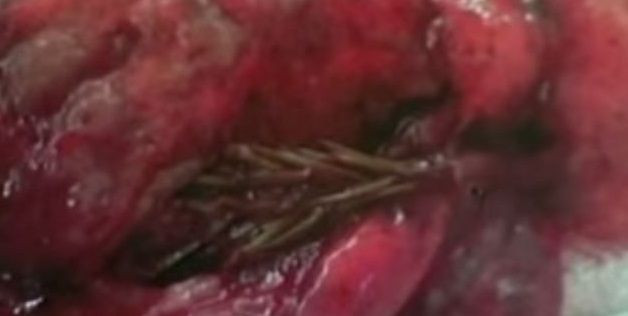Take A Deep Breath: 4 Weird Things Doctors Have Found In People's Lungs

X-rays help diagnose things like broken bones or fluid-filled lungs and are used as a precautionary step when something is amiss with our respiratory system. Painfully unusual wheezing, shallow breathing, and a tight chest can be a life-threatening emergency that can take our breath away, literally. Foreign body aspiration occurs when we breathe in a solid or semisolid object and it becomes lodged in our larynx or trachea, and may cause complete obstruction of the airway.
According to the University of Texas Medical Branch Department of Otolaryngology, in 2000 there were 17,000 emergency room (ER) aspiration- and ingestion-related visits. The majority of these patients were young than 3 years of age and male. However, every year adults aspirate a foreign body and do not recall ever choking, gagging, or coughing when something goes down the wrong pipe. Coughing, chest pains, and a fever are among the common symptoms of this uninvited “lung guest” that takes residence.
Take a look at this compilation of weird foreign bodies found lodged in people’s lungs that will make you take a deep breath.
1. 2-Year-Old Fast Food Fork Piece
A North Carolina man who was plagued by a persistent cough learned the reason for his heavy breathing had to do with a fast food meal he had two years before. Doctors at Duke University Medical Center in Durham, N.C. found a 1-inch piece of a plastic fork with the Wendy’s logo still legible in 50-year-old John Manley’s chest.
"I like to take big gulps of drink," the former home remodeler told ABC News. "I don't know of any other ways of it getting in there."
Dr. Momen Wahidi, director of interventional pulmonology at Duke, who mostly works with cancer patients to remove tumors from their lung airways, inserted a camera and other instruments to examine the mystery object that was lodged in his left lung.
“We’re looking at it and realizing that there are letters on it. … We started reading out loud, ‘A-M-B-U-R-G-E-R-,’ and realized it spelled ‘hamburgers.’” After the surgery, Manley admits there is a huge difference in his quality of life where we can breathe now.
2. Sprouting Fir Tree
A Russian man from the Urals region of Russia inhaled a seed that then sprouted inside his lung. Twenty-eight-year-old Artyom Sidorkin was believed to have cancer after he came to doctors complaining of severe chest pains and coughing up blood. According to Sky News, an X-ray showed what was believed to be a tumor in Sidorkin’s lung, which prompted doctors to perform a biopsy.
However, both doctors and Sidorkin got a surprise when they investigated the tissue during the biopsy.
"I thought I was hallucinating," said Dr. Vladimir Kamashev from Izhevsk in the Urals. "I asked my assistant to have a look: 'Come and see this — we've got a fir tree here.'"
Sidorkin admitted he did not feel any foreign object inside him. The 2-inch spruce touching his capillaries and causing severe pain was removed.
3. 3.5-Inch Fish
A boy from Madya Pradesh, India, began to have trouble breathing after playing in a river with some friends. After seeking medical attention, doctors revealed 12-year-old Anil Barela had a 3.5-inch fish in his lung, The Huffington Post reported. Dr. Pramod Jhawar, a chest specialist and bronchoscope expert acknowledged this is the first case he had come across in 20 years.
"The fish was live and taking its last breath when the bronchoscopy was done, restricting the functioning of both the lungs, resulting in low intake of oxygen," Jhawar said. Barela was apparently playing the “game” swallowing live fish, which is a popular pastime among the local children.
4. Small Pea Plant
Doctors believed a Massachusetts man had lung cancer after the lifelong smoker began feeling fatigue, loss of appetite, and persistent coughing. After being hospitalized for 10 days, a lung biopsy discovered the cause of 75-year-old Ron Sveden’s symptoms was a 1-and-a-half-inch-long pea plant growing in one of his lungs, ABC News reported. Sveden and doctors believe while the man ate peas, one must have went into his windpipe, lodged into his lungs and began sprouting.
“It was probably there for quite a while because of its growth status,” Sveden said. He was amused when his doctor gave him the diagnosis. “It took two minutes for it to sink in and I thought it was quite funny,” he said.
Luckily, these patients can take a deep breath and be thankful these foreign bodies in their lungs did not do more harm.
Published by Medicaldaily.com



























